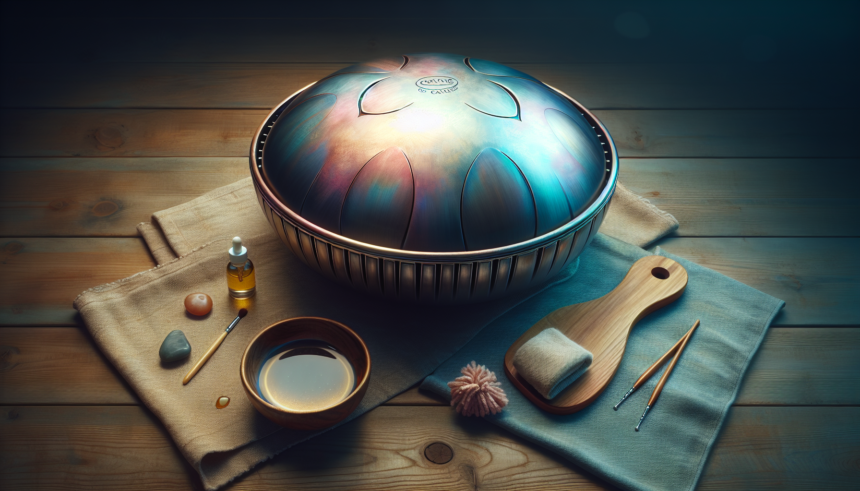The handpan is a unique and beloved musical instrument with a mesmerizing, ethereal sound. Handpans, often referred to as “hang drums,” require proper care to maintain their longevity and the quality of their sound. One of the most crucial aspects of handpan maintenance is oiling. Proper oiling is essential for the longevity of your handpan, ensuring that it continues to produce the beautiful and resonant tones that attract players and listeners alike.
Understanding the Handpan
Before diving into the specifics of oiling, it’s essential to understand the handpan itself. This steel instrument, crafted with a unique tuning system, is typically exposed to various environmental factors that can affect its condition over time. Handpans are usually made from nitrided steel, stainless steel, or other forms of treated metal. Each type of metal has its benefits and care requirements, but all require regular maintenance to prevent corrosion and other damage.
Why Oiling is Essential
Oiling your handpan is a preventive measure that serves multiple purposes:
- Preventing Rust: Steel instruments are prone to rust, especially in humid environments or when exposed to moisture. Oiling creates a protective layer that prevents water and air from causing rust.
- Maintaining Sound Quality: Corrosion and rust can significantly affect the sound quality of a handpan. Regular oiling ensures that the instrument retains its resonance and tonal clarity.
- Protecting the Finish: The finish of a handpan can wear away over time, especially in areas where the hands frequently contact the surface. Oiling helps preserve the finish, maintaining the instrument’s aesthetic appeal.
- Ease of Cleaning: An oiled surface is easier to clean and less likely to accumulate dirt and grime. Regular oiling also makes it easier to wipe away fingerprints, dust, and other particles.
The Oiling Process
Proper oiling of your handpan involves several steps, each of which is crucial for ensuring the instrument’s longevity:
1. Clean the Surface
Before applying oil, you should clean the handpan surface. Use a soft cloth dampened with a gentle, non-abrasive cleaner or a mixture of water and mild soap. Wipe the entire surface to remove any dust, fingerprints, or contaminants. Make sure to dry the handpan thoroughly with a clean, dry cloth.
2. Choose the Right Oil
Not all oils are suitable for handpans. It’s important to choose a high-quality oil that does not leave a sticky residue or have any abrasive properties. Commonly used oils include mineral oil, coconut oil, and specialized handpan oils available from instrument manufacturers. Avoid oils that contain additives or are designed for other purposes.
3. Apply the Oil
Using a soft, lint-free cloth, apply a small amount of oil to the surface of the handpan. Spread the oil evenly, making sure to cover all areas, including the sides and bottom. Use a circular motion to massage the oil into the metal, ensuring that it forms a protective layer. Be careful not to over-apply the oil, as excess oil can attract dust and dirt.
4. Let the Oil Absorb
After applying the oil, let it sit for a few minutes to allow the metal to absorb it fully. This process ensures that the protective layer forms adequately. If needed, you can gently buff the surface with a clean cloth to remove any excess oil and give the handpan a polished look.
5. Regular Maintenance
Oiling should be part of your regular maintenance routine. Depending on the environment and frequency of use, you should oil your handpan every few weeks or months. If you live in a humid area or play the instrument outdoors, more frequent oiling may be necessary. Always store your handpan in a cool, dry place when not in use.
Additional Handpan Care Tips
In addition to regular oiling, here are some other tips to help you care for your handpan:
- Handling with Care: Always handle your handpan with clean hands to avoid transferring oils and dirt from your skin onto the instrument’s surface.
- Avoiding Extreme Temperatures: Exposure to extreme temperatures can damage the metal and affect the tuning of your handpan. Avoid leaving it in hot cars or direct sunlight for extended periods.
- Using a Protective Case: Invest in a high-quality protective case for your handpan. This case will help protect the instrument from physical damage during transportation and storage.
- Regular Inspections: Periodically inspect your handpan for any signs of damage, rust, or wear. Addressing issues early can prevent more significant problems and prolong the life of your instrument.
Conclusion
Proper care and maintenance of your handpan are essential to ensure its longevity and the quality of its sound. Oiling is a critical aspect of this maintenance routine, providing a protective layer that prevents rust, maintains sound quality, and keeps the instrument looking its best. By following the steps outlined in this article and incorporating regular oiling into your care routine, you can enjoy the beautiful and resonant tones of your handpan for years to come.
FAQs about Handpan Care
1. How often should I oil my handpan?
The frequency of oiling depends on your environment and the instrument’s usage. Typically, oiling every few weeks to a few months is sufficient. In humid climates or with frequent outdoor use, more frequent oiling may be necessary.
2. Can I use any oil for my handpan?
No, it’s crucial to use an appropriate oil such as mineral oil, coconut oil, or specialized handpan oils. Avoid oils with additives or those designed for other purposes, as they can damage the instrument.
3. What should I do if my handpan starts to rust?
If you notice rust on your handpan, gently remove it with a fine, non-abrasive cloth or a rust remover recommended by your handpan manufacturer. After removing the rust, thoroughly clean and oil the instrument to prevent further corrosion.
4. How can I prevent my handpan from getting damaged during transport?
Invest in a high-quality protective case designed specifically for handpans. These cases provide excellent protection against physical damage and environmental factors during transport and storage.
5. Is there a specific cleaner for handpans?
Yes, there are gentle, non-abrasive cleaners specifically designed for handpans. Alternatively, a mixture of water and mild soap can be used. Always ensure the handpan is thoroughly dried after cleaning.





